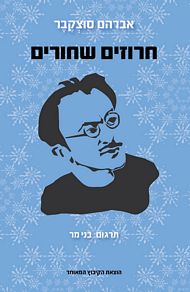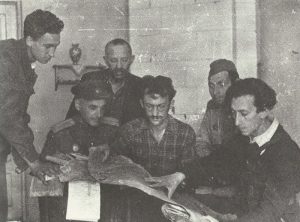Avraham Sutzkever-Burnt Pearls
 The worst thing that could happen to a poet happened to Abraham Sutzkever. Eli Eliyahu 03.10.2015
The worst thing that could happen to a poet happened to Abraham Sutzkever. Eli Eliyahu 03.10.2015
Many disasters befell the poet Abraham Sutzkever, but perhaps the heaviest was the death of his language - Yiddish - during his lifetime. The new book "Burnt Pearls", with a selection of his work, presents the stations of his life in Jewish and human history.
Eli Eliyahu 03.10.2015
For a poet, it is impossible to imagine a greater tragedy: to see in his lifetime how the language in which all his poems were written, disappear from the world, and no one reads or speaks it anymore. This rare thing happened to the poet Abraham Sutzkever, and other poets of the Yiddish language.
Although Sutzkever's poems (1913–2010) were translated into Hebrew by many translators, and he even won the Israel Prize in 1985, Israeli culture sought to repress the days of the diaspora from collective memory, treating Yiddish as something repelling. (In the early days of the State, it was even forbidden to put on plays in Yiddish). Hence, Sutzkever's poems did not really succeed in crossing the language barrier and become part of Israeli culture and Hebrew poetry.
 Perhaps precisely now, over the years, when Eastern culture, repressed for years, has managed to raise its head a little and integrate into Israeli space, it is possible to break down more walls that Zionism has built in front of Jewish diaspora culture, and bring in Yiddish and its culture without fearing that it endangers "Israeliness."
Perhaps precisely now, over the years, when Eastern culture, repressed for years, has managed to raise its head a little and integrate into Israeli space, it is possible to break down more walls that Zionism has built in front of Jewish diaspora culture, and bring in Yiddish and its culture without fearing that it endangers "Israeliness."
This is also the hope of Benny Mer, who has translated and edited a selection of Sutzkever's work and collected it in the book called "Burnt Pearls" (published by Kibbutz Hameuchad). "Paradoxically, Yiddish today represents Ashkenazi hegemony, even though it previously vehemently denied it. Ben-Gurion called it, for example, a 'foreign and jarring language.'" says Mer. "This translation seeks to bring Sutzkever closer to contemporary Hebrew culture, through an attempt to choose vernacular Hebrew, without attempting to elevate the language, as had been done many times before, or to adopt Yiddishism to please those who have heard Yiddish at home."
 Mer, editor of Haaretz’ "Books" supplement, chose a special format for the book. He collected the poems, pieces of prose as well as lectures by Sutzkever that had never been translated; however, he did not edit them in the order in which they were written, but in an order based on the poet's biography. For example, poems Sutzkever wrote about his childhood appear at the beginning of the book, regardless of when they were written.
Mer, editor of Haaretz’ "Books" supplement, chose a special format for the book. He collected the poems, pieces of prose as well as lectures by Sutzkever that had never been translated; however, he did not edit them in the order in which they were written, but in an order based on the poet's biography. For example, poems Sutzkever wrote about his childhood appear at the beginning of the book, regardless of when they were written.
Thus a kind of imaginary autobiography is created in this book, and the reader learns about the chronology of Sutzkever's life through the works of the poet himself. Sutzkever probably would have liked this kind of editing, because in his speech at a 1959 Montreal conference quoted in the book, he said, among others: "The true biography of a poet's life is his work, just as the biography of the prophet is his prophecy."
But Mer himself tries to qualify. "Burnt Pearls” is far from being a biography," he says. "A first-person testimony is not an objective life story, especially in Sutzkever's story which mixes poetic imagination with reality and creates a legendary version of history. This book is just an inset of black and white rhymes (like one of his poems) into a string of poetic phrases in a certain order. Of course you can also read them separately, and in a completely arbitrary order."
Sutzkever was born in Lithuania but spent his childhood in Siberia, whose landscapes greatly influenced his poems. "His first inspiration was the frozen and mineral landscapes of Siberia," says Dr. Roy Greenwald, translator of Sutzkever's poems. "One might think that Yiddish poetry, representing national and religious culture, would be more related to history and less to nature, but Sutzkever's poetry is very private. His interest is in the cosmos, landscapes, and the murky and crystal clear landscape of Siberia. It is a metaphor for his poetry as a whole, which is also murky clear and crystal clear. "
What do you think is his importance?
"Sutzkever is the classic modernist writer of Yiddish poetry. There are great poets in Yiddish, but there is no other modernist like him in 20th century poetry. With his strengths and applied refinement, I can compare him to a poet like Osip Mandelshtam. I think the choice to edit the book as a kind of biography is a good choice, since in addition to being a wonderful poet, Sutzkever is also an important historical figure. He edited Di goldene keyt (The Golden Chain), an important journal of Yiddish literature, and witnessed the Nuremberg trials."
Sutzkever's father died in his youth, and in 1920 his widowed mother returned with her three children to Lithuania and settled in Vilna, its capital city. Therefore, at the start of the Nazi occupation, Sutzkever was in the Vilna Ghetto and later joined the partisans in the forests of Belarus. The poems he wrote in the Ghetto, including the poem "Kol Nidrei," made such an impression on Jewish readers in Moscow that in 1944 a special plane was sent to bring him in from the forests of Belarus to the Russian capital.
"Sutzkever has been involved in some of the greatest dramas in human and Jewish history of the 20th century: the Holocaust and the establishment of the State of Israel; and he describes them again and again in his work," says Mer.
He explains that his choice of this format for the book stemmed from the fact that there is "something narrative in many of his poems, and the biographical story is very prominent. Although Sutzkever wrote modernist poetry, it often lacks context, time and place. From the beginning, his life story is reflected in his poetry."
One of the chilling passages in the book is a confession by Sutzkever that describes the experiences he underwent during the Holocaust, but also about his intense desire for poetry and its place in his life. In this confession, Sutzkever recounts how he hid in an attic in the Ghetto and discovered the body of a dead Jew next to him. "I fingered a piece of charcoal," Sutzkever writes, "and began to write a poem on the corpse as if I were writing on paper."
"Sutzkever succeeded, as people seldom did, to write about the Holocaust when at its height, without any perspective," says Mer. "However, even after the perspective of decades, he remains in my eyes, among the handful of poets who succeeded in turning the Holocaust into a sublime work of art. Sutzkever is not a historian, and his poems are not only a description of Holocaust events, but an expression of pure human grief. For example, the poem 'My Mother' is one of the most beautiful laments I know."
Is there anything new you discovered about Sutzkever's work while translating?
"While translating, the music of Sutzkever's poetry was revealed to me, beyond its meter: For example, in the poem 'Letter' (p. 60), describing Sutzkever first journey from Vilna to Warsaw, the words echo the rhythm of the train; so does the wagon full of shoes carried from Vilna to Berlin in the poem The Wagon of Shoes. It also sharpened for me the humor in his work, for example the self-irony in the poem 'Wonderful Words'. This characteristic balances the classicism of this poetry, and enriches even tragic experiences. There are also mere revelations that came to light in an in-depth reading while translating, as in the ‘Poem About Nothing', in which the old poet looks out the window on the sixth floor and sees the nothing, sees death: 'Nothingness / attacks me with his dreaded knife'."
How is Sutzkever's poetry relevant today?
"Sutzkever's poetry deals with significant issues. Most of his work addresses metaphysical questions, and even more so in his intimate poems, as in the later 'Poems from My Diary' collection, from the 70s and 80s: God, life and death, youth, old age, etc. His work spans more than 60 years, and is also of high quality, partly because of the bridges - in form and content, images and narratives - between major and minor, between the worlds of yesterday, between Europe and its poetry, and Israel, etc. I am no less surprised by this work than I am by my reading of the works of Shakespeare: many times, it jumps from peak to peak. Just as Shakespeare is relevant, so is the poetry of Shlomo Ibn Gvirol, Mayakovski, and Sutzkever. Good poetry, if it expresses the human psyche, is always relevant, even if written in Akkadian or translated from the Finnish.”
"Another factor that makes Sutzkever stand the test of time is his adherence to the classical forms of poetry, in rhyme and meter, in a very complex synthesis. Precisely because he shapes his work and is so severe and restrained, he manages to escape kitsch - and thus arouse emotion. Yet, Sutzkever also knows how to take things lightly and make you laugh."
Returning to Yiddish and its disappearance from Jewish culture, Greenwald says: "Sutzkever is the classical modernist of Yiddish poetry. There are other great poets, but no other poet has given such refined expression to the Yiddish language. He wrote at a time committed to different political ideas, but wrote a different type of poetry, polished and soaked in nature."
"Sutzkever repeatedly addressed the question of the status of Yiddish in particular, and of the diaspora in general, in a country of an ingathering of exiles," adds Mer. "I was interested to see how his poetry turned snowy landscapes into desert landscapes, and his awareness that Yiddish joins the languages of the Jews who also came to the Land, out of recognition of its value, but without any sense of superiority."
“Thus Sutzkever writes in his last poem, in 1994: ‘Find a translation, my little word, pure / Wonders will still appear, burn in the dark / Return time from its end, from the depths, - even the past will be revealed again/ (…) My language lives. In the darkness dawn will not decline. / My language is beneath my skin, muscular, it will begin to demand, / and will be worn like tefillin on the head.’ (Trans. unofficial translation).
"I do not find Yiddish chauvinism in this poem," Mer concludes, "but an expression of cultural richness. Perhaps like him, I would have liked to read classics from all cultures - and certainly Jewish culture from other communities."

